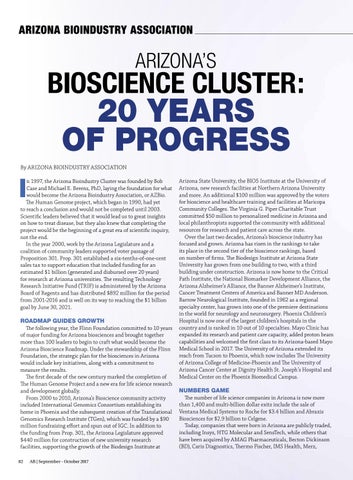ARIZONA BIOINDUSTRY ASSOCIATION
ARIZONA’S
BIOSCIENCE CLUSTER:
20 YEARS OF PROGRESS
By ARIZONA BIOINDUSTRY ASSOCIATION
I
n 1997, the Arizona Bioindustry Cluster was founded by Bob Case and Michael E. Berens, PhD, laying the foundation for what would become the Arizona Bioindustry Association, or AZBio. The Human Genome project, which began in 1990, had yet to reach a conclusion and would not be completed until 2003. Scientific leaders believed that it would lead us to great insights on how to treat disease, but they also knew that completing the project would be the beginning of a great era of scientific inquiry, not the end. In the year 2000, work by the Arizona Legislature and a coalition of community leaders supported voter passage of Proposition 301. Prop. 301 established a six-tenths-of-one-cent sales tax to support education that included funding for an estimated $1 billion (generated and disbursed over 20 years) for research at Arizona universities. The resulting Technology Research Initiative Fund (TRIF) is administered by the Arizona Board of Regents and has distributed $892 million for the period from 2001-2016 and is well on its way to reaching the $1 billion goal by June 30, 2021. ROADMAP GUIDES GROWTH The following year, the Flinn Foundation committed to 10 years of major funding for Arizona biosciences and brought together more than 100 leaders to begin to craft what would become the Arizona Bioscience Roadmap. Under the stewardship of the Flinn Foundation, the strategic plan for the biosciences in Arizona would include key initiatives, along with a commitment to measure the results. The first decade of the new century marked the completion of The Human Genome Project and a new era for life science research and development globally. From 2000 to 2010, Arizona’s Bioscience community activity included International Genomics Consortium establishing its home in Phoenix and the subsequent creation of the Translational Genomics Research Institute (TGen), which was funded by a $90 million fundraising effort and spun out of IGC. In addition to the funding from Prop. 301, the Arizona Legislature approved $440 million for construction of new university research facilities, supporting the growth of the Biodesign Institute at
82
AB | September - October 2017
Arizona State University, the BIO5 Institute at the University of Arizona, new research facilities at Northern Arizona University and more. An additional $100 million was approved by the voters for bioscience and healthcare training and facilities at Maricopa Community Colleges. The Virginia G. Piper Charitable Trust committed $50 million to personalized medicine in Arizona and local philanthropists supported the community with additional resources for research and patient care across the state. Over the last two decades, Arizona’s bioscience industry has focused and grown. Arizona has risen in the rankings to take its place in the second tier of the bioscience rankings, based on number of firms. The Biodesign Institute at Arizona State University has grown from one building to two, with a third building under construction. Arizona is now home to the Critical Path Institute, the National Biomarker Development Alliance, the Arizona Alzheimer’s Alliance, the Banner Alzheimer’s Institute, Cancer Treatment Centers of America and Banner MD Anderson. Barrow Neurological Institute, founded in 1962 as a regional specialty center, has grown into one of the premiere destinations in the world for neurology and neurosurgery. Phoenix Children’s Hospital is now one of the largest children’s hospitals in the country and is ranked in 10 out of 10 specialties. Mayo Clinic has expanded its research and patient care capacity, added proton beam capabilities and welcomed the first class to its Arizona-based Mayo Medical School in 2017. The University of Arizona extended its reach from Tucson to Phoenix, which now includes The University of Arizona College of Medicine-Phoenix and The University of Arizona Cancer Center at Dignity Health St. Joseph’s Hospital and Medical Center on the Phoenix Biomedical Campus. NUMBERS GAME The number of life science companies in Arizona is now more than 1,400 and multi-billion dollar exits include the sale of Ventana Medical Systems to Roche for $3.4 billion and Abraxis Biosciences for $2.9 billion to Celgene. Today, companies that were born in Arizona are publicly traded, including Insys, HTG Molecular and SensTech, while others that have been acquired by AMAG Pharmaceuticals, Becton Dickinson (BD), Caris Diagnostics, Thermo Fischer, IMS Health, Merz,
